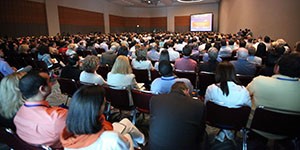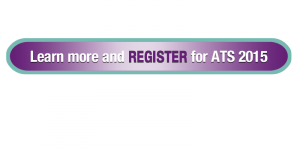
Photo: Steve Schneider
The presentation of basic and translational scientific discoveries are essential to the full scope programming of the ATS International Conference. In the ATS 2015 Basic Science Core, explore the importance of host pathogen interactions and host defense over several days, see early career investigators pitch their innovative proposals in the BEAR (Building Education to Advance Research) Cage and network with other researchers at the Science and Innovation Center, learn about new products in services in the dedicated space of the Basic Science Center of the Exhibit Hall, and take in additional scientifically focused presentations.
Basic Science Core
Infectious diseases have long existed, but threats that have gained widespread attention such as Ebola and the Middle East respiratory syndrome coronavirus have again highlighted the importance of new research in this field. During the ATS 2015 International Conference, organizers of the third Basic Science Core will present the theme “Host Pathogen Interactions and Host Defense.”
“It’s an exciting time to be doing this research,” says Jeffrey L. Curtis, MD, chair of the symposium How Pathogens Evade Immune Defenses and How We Can Fight Back. “A lot of what we thought we knew about infectious diseases hasn’t proven to be totally true. The field is evolving very rapidly.”
During the Basic Science Core, a thematically linked set of symposia and abstract-based sessions that are coordinated on consecutive days, presenters will cover research discoveries and how technological advances are revolutionizing the field. The Basic Science Core, which was introduced at ATS 2013, is jointly developed by the Assemblies on Respiratory Structure & Function, Respiratory Cell & Molecular Biology, and Allergy, Immunology & Inflammation.
Science & Innovation Center
The Science and Innovation Center will host networking and interactive sessions by experts. This year, the center will feature the SIC 101 series each morning, where attendees can learn the basic principles underpinning high profile symposia at ATS 2015 Denver. Topics planned include biofilms, autophagy, flow cytometry, and proteostasis. Special events are also being planned, including the BEAR (Building Education to Advance Research) Cage , presented by the ATS Drug Device Discovery and Development Committee. On Sunday afternoon at 1:30 p.m., BEAR Cage will feature three early career investigators who will pitch their research proposals to a panel of translational science experts in front of a live audience. On Tuesday morning, a representative from the National Heart, Lung, and Blood Institute will present to attendees and answer questions. (Learn more about the networking opportunities in “Where to Meet New Colleagues at ATS 2015.”)
Basic Science Section
Located inside the Exhibit Hall, the Basic Science Section gives basic scientists and researchers the opportunity to learn about products or services that can help advance their research. Representatives from six companies will be available to talk with attendees about their products and services in one convenient place:
- DMT-USA
- Eco Medics/ Eco Physics
- Hugo Sachs Elektronik/Harvard Appartatus
- Militenya Biotec
- QunataMatrix, Inc.
Additional Scientific Symposia
Nontuberculous mycobacterial infections are increasing and challenging to diagnose and treat. Recent studies have documented significant increases in the incidence and prevalence of pulmonary NTM infections. The reasons for the increases are not well understood, but environmental exposures are thought to be the source for most infections. During the scientific symposium “Nontuberculous Mycobacterial Infections: An Evolving Paradigm” on Sunday, May 17, speakers will discuss the patient perspective, transmission of NTM, what has been learned from genomics, the modern mycobacteriology laboratory, and new drugs and deliveries available to clinicians.
Also that day, the workshop “Specimen Acquisition Ascertainment of Mutational Markers in Non-Small Cell Lung Cancer” will focus on the clinical importance and technical aspects to gathering and processing specimens for genetic mutational analysis from different thoracic sources (i.e., mediastinal lymph nodes, peripheral lung lesions, and pleural material). A separate registration fee is required, and attendance is limited.

